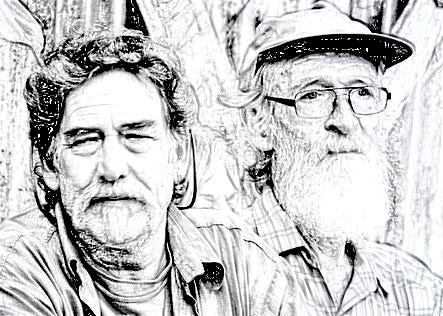Second Sunday of Lent
Genesis 22:1-2, 9a, 10-13, 15-18
Mark 9:2-10
Why did God choose Moses and Elijah as the heavenly witnesses along with Peter, James, and John at the Transfiguration of Jesus? We can make sense of the three apostles since they stood out in scripture several times as the inner circle of Jesus. Why Moses and Elijah?
Image by denninglove
Peter wrote about the Transfiguration to affirm he and his apostle buddies witnessed Jesus' glory (2 Peter 1:16-18). John, too, wrote in his gospel, “and we saw his glory, the glory as of the Father’s only Son, full of grace and truth” (John 1:14). For the disciples, the Transfiguration was a transitory moment, a cosmic revelation of Jesus’ nature and divinity.
God’s voice, mirroring Jesus’ baptism, seals the presence of the divine at the Transfiguration. The event is heightened in mystery by the presence of two ancient prophets. In front of all, God says, “This is my beloved Son. Listen to him.” (Mark 2:7).
Still, why Moses and Elijah? For instance, there are several biblical characters of esteem — Abraham, Noah, and Enoch.
The Church leaves God’s choice of Moses and Elijah to speculation. A double dose of prognostication by many theologians hints that the two witnesses in the Book of Revelation, some days or eons into the future (only guessing is allowed), might well be Moses and Elijah because of their presence at the Transfiguration.
The somewhat obscure description in Revelation could point to our familiar and ancient friends of Jesus. (Remember, I’m just guessing) Moses and Elijah are the two witnesses spending three and a half years (42 months) preaching and prophesying in the Holy City. God speaks about them. "I will commission my two witnesses to prophesy for those twelve hundred and sixty days, wearing sackcloth. These are the two olive trees and the two lampstands that stand before the Lord of the earth.”
If so, Moses waited 1,500 years from his life in the desert before reappearing at the Transfiguration. Elijah waited 900 years. So, they would be practiced at waiting for God to use them, primed for the “end of days” prophesied in the Book of Revelation. It’s already been 2,000 years since the Transfiguration, so maybe the Transfiguration was just a warm-up act?
While the fascination with the two being further used by God at the end of time remains obscure and speculative, there are similarities to Moses and Elijah that lend more credence to their unique friendship with Jesus.
You were destined, it is written, in time to come to put an end to wrath before the day of the LORD . . . (Sirach 48:10) wrote Sirach about Elijah.
In Deuteronomy 34:10, God states, “Since then no prophet has arisen in Israel like Moses, whom the LORD knew face to face . . .”
Elijah is a fantastic fellow, performing miracles like changing the weather to raising the dead. He breathed rarified air. If you’ve met anybody like that, you should be making a documentary like Sirach.
Another clue to Elijah’s rarity is that prophets are compared to him, not the other way around. He fulfills a unique quality, similar to Moses and Melchizedek. Those who follow God are filled with the spirit of Elijah. Elisha and John the Baptist are the two most clearly identified Elijah-like prophets in scripture.
There is also something futuristic about Elijah, which brings us to the “end times” and Sirach’s “day of the Lord” predictions. The “wrath” that Elijah will reportedly end isn’t something that’s already happened. Why? The “Day of the Lord” is associated with Jesus’ second coming.
Moses’ entire life is one of miraculous endeavors. From his basket journey into the arms of Egypt’s royalty to his 40-year sojourn with the people of God, he single-handedly (well, with two arms at one point, all under the guidance of God) led the Hebrews to the promised land.
Elijah was likened to Moses throughout scripture as a significant force among the world’s authorities. Elijah lived in the 9th Century BC, and Moses in the 15th. They’re not close in history but similarly significant. Jesus made friends with these two before his incarnation. I don’t think that’s a stretch since he makes friends with all of us.
Moses and Elijah didn’t work alone. They had spokespersons in Aaron and Obadiah. Their wives were introduced during a request for water — one at a well, the other at a river. They both suffered plagues upon their adversaries and dealt with God upon a mount — Elijah on Carmel and Moses on Sinai. Lastly, they encountered the passing glory of the Lord in the same dagnabbed cave in Horeb!
The two witnesses described in Revelation match the prophetic exploits of Moses and Elijah’s lives on earth. Elijah closed up the sky, holding back the rain. He did that three times. Moses had the power to afflict the earth with plagues ten times, including turning water into blood, and held back the sea for the Hebrews to escape Egypt.
Scripture records Elijah covering his face with his cloak when he met the Lord, and Moses needed to cover his glowing face after speaking with God in the burning bush.
Unconnected coincidences? It can’t be.
Lots of syncopated events take place with incredible similarities between the two. Moses is a more common name among Gentiles and is even written about extensively in the Moslem Quran, challenging the Pharaoh. We might not place Elijah so quickly into that heavenly pay grade, but scripture mentions him fourteen times.
If you’re looking to these two for insight, they tell us the way to become one of Jesus’ close friends is to let his Holy Spirit lead us to witness. Elijah allowed that to happen. Moses did, too. No one in heaven would be surprised or jealous that Jesus picked those two for the Transfiguration. Mostly, they're watching to see if we will get on board.
The friendship began with God calling them. The same story is told of Mary, Joseph, Jonah, and David. They waited to be asked. Most argued about that call, but they all eventually said, “Yes.”
Isn’t that just like us? “Yeah, but . . .” We have all likely responded negatively to prompts from the Holy Spirit. He first asks us to do simple things, like put aside this desire and that. It might be food or shiny objects. Only when we trust God and respond appropriately will the prompts become bigger.
It’s not a matter of the big stuff passing us by. It’s us not bending our wills over the little things.
That’s the thing about all friendships. We love each other and tell each other we’d die on the beach without compromising our faithfulness. We know that’s the right thing to do, but not until that challenge arrives will we discover how practiced and courageous we are at setting aside our wills.
Failing the Holy Spirit's promptings — Elijah and Moses did, at times — teaches us to be remorseful and repentant. We beg forgiveness when we fail at witnessing, but more so when we know how painful our failures have been to God’s plans.
More extraordinary than problematic is that we only need to wait for God’s next prompting. We should not despair over our missed opportunities. Even after unfortunate and dismissive testing by God, we can start over. Wait for him once again. Look how old Moses was when he was finally ready for God’s plan.
I find it fascinating that Elijah and Moses could be the appropriate witnesses confirming to the world on the "Day of the Lord" that Jesus is returning with his saints and the angels. The more we listen to God’s prompts, though, all that matters is what he has in mind for us.
You can read the story of Jesus with Moses and Elijah at the transformation here - https://bible.usccb.org/bible/luke/9. And you can read the prophecy of the two witnesses at the announcement of the second coming here - https://bible.usccb.org/bible/revelation/11.
Read John’s new book, Frank & Ralph, a fictional novel about the retired Guardian Angels of Jesus, in Catholic Nutshell News.
Chapter 3 of Frank & Ralph, ‘Stares from Heaven,’ excerpt:
“In a very real way, Frank and Ralph were the only combinations of angelic holiness with a brokenness familiar to human existence . . . With trepidation, the angelic hosts watched Frank and Ralph.”
Paid subscribers (only $6 a year) get access to new chapters as they are added throughout the coming months.







